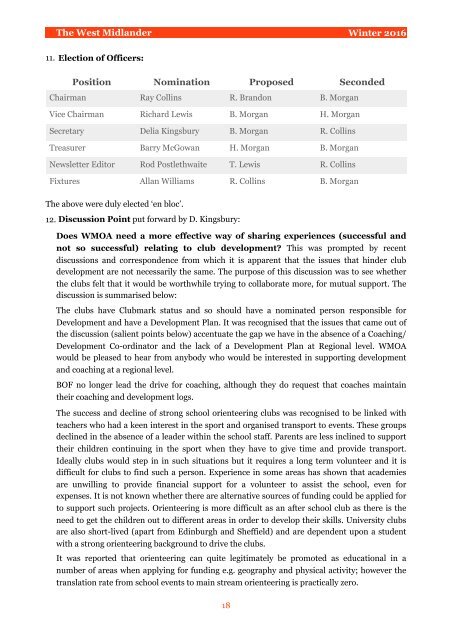The West Midlander
wm_1601
wm_1601
Create successful ePaper yourself
Turn your PDF publications into a flip-book with our unique Google optimized e-Paper software.
<strong>The</strong> <strong>West</strong> <strong>Midlander</strong> Winter 2016<br />
11. Election of Officers:<br />
Position Nomination Proposed Seconded<br />
Chairman Ray Collins R. Brandon B. Morgan<br />
Vice Chairman Richard Lewis B. Morgan H. Morgan<br />
Secretary Delia Kingsbury B. Morgan R. Collins<br />
Treasurer Barry McGowan H. Morgan B. Morgan<br />
Newsletter Editor Rod Postlethwaite T. Lewis R. Collins<br />
Fixtures Allan Williams R. Collins B. Morgan<br />
<strong>The</strong> above were duly elected ‘en bloc’.<br />
12. Discussion Point put forward by D. Kingsbury:<br />
Does WMOA need a more effective way of sharing experiences (successful and<br />
not so successful) relating to club development? This was prompted by recent<br />
discussions and correspondence from which it is apparent that the issues that hinder club<br />
development are not necessarily the same. <strong>The</strong> purpose of this discussion was to see whether<br />
the clubs felt that it would be worthwhile trying to collaborate more, for mutual support. <strong>The</strong><br />
discussion is summarised below:<br />
<strong>The</strong> clubs have Clubmark status and so should have a nominated person responsible for<br />
Development and have a Development Plan. It was recognised that the issues that came out of<br />
the discussion (salient points below) accentuate the gap we have in the absence of a Coaching/<br />
Development Co-ordinator and the lack of a Development Plan at Regional level. WMOA<br />
would be pleased to hear from anybody who would be interested in supporting development<br />
and coaching at a regional level.<br />
BOF no longer lead the drive for coaching, although they do request that coaches maintain<br />
their coaching and development logs.<br />
<strong>The</strong> success and decline of strong school orienteering clubs was recognised to be linked with<br />
teachers who had a keen interest in the sport and organised transport to events. <strong>The</strong>se groups<br />
declined in the absence of a leader within the school staff. Parents are less inclined to support<br />
their children continuing in the sport when they have to give time and provide transport.<br />
Ideally clubs would step in in such situations but it requires a long term volunteer and it is<br />
difficult for clubs to find such a person. Experience in some areas has shown that academies<br />
are unwilling to provide financial support for a volunteer to assist the school, even for<br />
expenses. It is not known whether there are alternative sources of funding could be applied for<br />
to support such projects. Orienteering is more difficult as an after school club as there is the<br />
need to get the children out to different areas in order to develop their skills. University clubs<br />
are also short-lived (apart from Edinburgh and Sheffield) and are dependent upon a student<br />
with a strong orienteering background to drive the clubs.<br />
It was reported that orienteering can quite legitimately be promoted as educational in a<br />
number of areas when applying for funding e.g. geography and physical activity; however the<br />
translation rate from school events to main stream orienteering is practically zero.<br />
18


